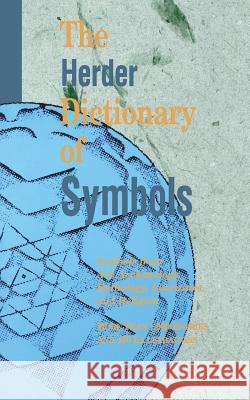The Herder Dictionary of Symbols: Symbols from Art, Archaeology, Mythology, Literature, and Religion » książka
The Herder Dictionary of Symbols: Symbols from Art, Archaeology, Mythology, Literature, and Religion
ISBN-13: 9780933029842 / Angielski / Miękka / 2013 / 228 str.
The Herder Dictionary of Symbols: Symbols from Art, Archaeology, Mythology, Literature, and Religion
ISBN-13: 9780933029842 / Angielski / Miękka / 2013 / 228 str.
(netto: 101,53 VAT: 5%)
Najniższa cena z 30 dni: 100,41 zł
ok. 13-18 dni roboczych.
Darmowa dostawa!
This new edition of Chiron's popular guide to the meaning of symbols in religion, archaeology, mythology, art, dreams, fairy tales, and literature contains more than 450 illustrations and 1,000 entries from around the world. In handy pocket size, it is of great assistance to anyone interested in dream interpretation, understanding symbolism in religion and art, and the overlapping meanings of symbols from different cultures. Beautifully produced and authoritative, this detailed survey reveals an abundance of types of human symbolic thinking.
This edition of Chiron’s popular guide to the meaning of symbols in religion, archaeology, mythology, art, dreams, fairy tales, and literature contains more than 450 illustrations and 1,000 entries from around the world. In handy pocket size, it is of great assistance to anyone interested in dream interpretation, understanding symbolism in religion and art, and the overlapping meanings of symbols from different cultures. Beautifully produced and authoritative, this detailed survey reveals an abundance of types of human symbolic thinking.From the Introduction:Every language functions as vehicle for and mediator of meanings. So, too, the language of symbols lives from the tension between reference and referent. But while linguistic units, as, for example, the word, are assigned to the object meant in each instance, the symbol binds together designator and designated as tightly as possible. At times-especially in the mythico-magical view of the world-this bond is so intense that it often approaches an identity. Consequently, numerous meanings that we experience only as symbols were originally understood immediately as statements about realities. The sun was not the symbol of divine sight but rather was itself a god; the snake was not an image of evil but was evil itself; the color red was not merely a symbol of life but was itself vital energy. The boundary between mythical or magical ideas and symbolic thought is, consequently, seldom to be drawn sharply.…With the aid of examples the reader will find in the present volume a survey of the abundance of types of human symbolic thinking and will simultaneously be stimulated to further exploration. We hope this book will help those of us who often may too easily dismiss symbols as preconceptually imprecise not only to consume the flood of images from the mass media but also to reactivate the remnants of our imagistic thinking which have atrophied in the course of development. For, indeed, while the symbol may never be as precise as the abstract word, it always directs us to ponder the great complexity of reality.











